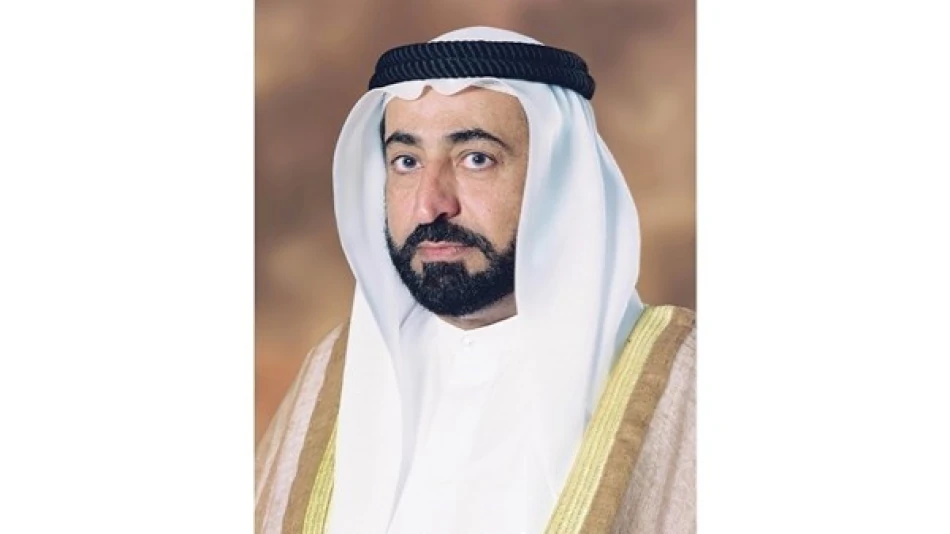
Ruler of Sharjah Issues Decrees to Establish Sharjah Council for Persons with Disabilities
Sharjah Establishes Groundbreaking Council to Champion Disability Rights in the Gulf
The Emirate of Sharjah has taken a pioneering step in the Gulf region by establishing a dedicated council for disability rights, positioning itself as a leader in inclusive governance. His Highness Dr. Sheikh Sultan bin Mohammed Al Qasimi, Ruler of Sharjah, issued an Emiri decree creating the Sharjah Council for the Rights of Persons with Disabilities, marking a significant institutional commitment to protecting and advancing disability rights across the emirate.
A New Model for Regional Disability Advocacy
The newly established council represents more than just administrative restructuring—it signals a fundamental shift toward recognizing disability rights as a cornerstone of modern governance. The council has been granted full legal personality and authority to conduct all necessary legal transactions to achieve its objectives, with its headquarters based in Sharjah city.
This move places Sharjah ahead of many regional peers in institutionalizing disability rights. While the UAE has made significant strides in accessibility and inclusion at the federal level, particularly with the "People of Determination" initiative launched in 2017, Sharjah's dedicated council structure creates a more focused and accountable framework for implementation.
Comprehensive Mandate with Real Teeth
The council's mandate extends far beyond symbolic gestures. Its objectives include ensuring persons with disabilities enjoy full rights and fundamental freedoms on equal terms with others, guaranteeing effective participation in society, and integrating disability programs into developmental management policies across all aspects of life.
Crucially, the council has been empowered with substantial operational authority. It can formulate general policies, develop strategic plans, approve necessary legislation and regulations, establish quality standards for disability services, and monitor government compliance with disability rights laws. Perhaps most importantly, it can establish mechanisms to monitor violations and create channels for receiving complaints—giving it genuine oversight power.
Strategic Leadership Structure
The council's composition reflects a strategic blend of governmental authority and grassroots representation. Chaired by Sheikh Sultan himself, the council includes representatives from Sharjah City for Humanitarian Services, the Department of Social Services, and disability clubs throughout the emirate.
The appointment of a Secretary-General with broad executive powers—including budget preparation, strategic plan implementation, and external representation—ensures the council will function as more than a ceremonial body. This operational structure mirrors successful disability rights frameworks in countries like Canada and Australia, where dedicated agencies have achieved measurable improvements in accessibility and inclusion.
Regional and Global Context
Sharjah's initiative comes at a time when Gulf states are increasingly focusing on social development as part of their economic diversification strategies. The UAE's broader "People of Determination" framework has already yielded tangible results, including improved accessibility in public transportation and employment initiatives. Saudi Arabia's Vision 2030 similarly emphasizes social inclusion, while Qatar has invested heavily in disability services ahead of and following the 2022 World Cup.
However, Sharjah's approach is distinctive in its institutional depth. By creating a dedicated council with legislative and monitoring powers, the emirate is establishing a model that could influence disability rights governance across the region.
Economic and Social Implications
From an economic perspective, this initiative aligns with global trends recognizing the substantial economic potential of inclusive policies. The World Health Organization estimates that persons with disabilities represent 15% of the global population, translating to significant consumer power and workforce potential when properly integrated.
For Sharjah, known for its cultural and educational initiatives, the disability rights council reinforces its positioning as a progressive emirate focused on human development. This could attract international organizations, NGOs, and businesses prioritizing social responsibility, potentially boosting the emirate's reputation as a destination for inclusive investment.
The council's authority to enter into contracts, agreements, and partnerships with relevant entities also suggests potential for international collaboration and knowledge transfer, positioning Sharjah as a regional hub for disability rights expertise and innovation.
As the council begins operations, its success will likely be measured not just in policy changes, but in tangible improvements to accessibility, employment rates, and social participation among persons with disabilities. If successful, Sharjah's model could become a template for institutional disability rights frameworks across the Gulf and broader Middle East region.
Most Viewed News

 Layla Al Mansoori
Layla Al Mansoori






